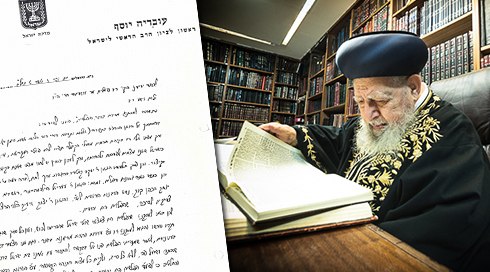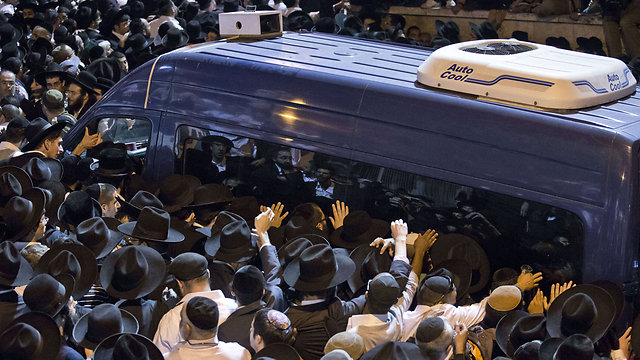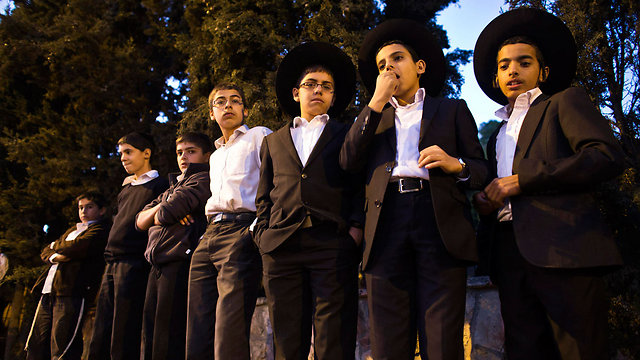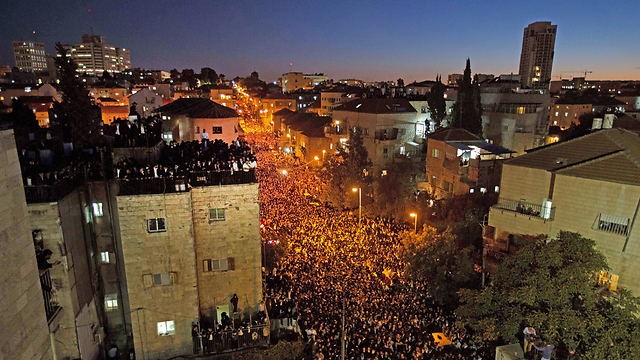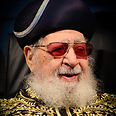
'Thanks to him I'm here': How Rabbi Yosef brought Ethiopians to Israel
Standing up to authorities, Rabbi Ovadia Yosef ruled Ethiopia's Jews are Jews for all intents and purposes, 40 years ago. 'He was alone and he stood by what he believed in,' says Ethiopian rabbi
"It was thanks to him that I came to Israel. He's the human, rabbinical shield, and thanks to him I'm here." These two sentences by a young Ethiopian-Israeli succinctly sum up the results of one of Rabbi Ovadia Yosef's most significant rulings, which led to Israel opening its gates to Ethiopian-Jewish immigrants.
Upon his death, many Ethiopian-Israelis now say: "We're the rabbi's Jews."
Related stories:
"In his mind he considers himself Jewish because of Rabbi Ovadia Yosef, and not because his ancestors were Jews who were at Mount Sinai," explained Rabbi Sharon Shalom, who spoke with the young man.
Document - courtesy of the State Archive (Photo: Yisrael Bardugo)
Shalom, a doctorate student at the Jewish philosophy department in Bar-Ilan University who emigrated from Ethiopia in 1982, added that "today it seems that the Israeli public opinion as well considers them (Ethiopians) the rabbi's Jews. He who in fact 'kosherized' Ethiopia's Jews and labeled them Jewish is Yosef, even though the Ethiopian-Jewish community existed for thousands of years. I grew up on this ruling."
The Ethiopian-Jews' chief rabbi, Yosef Hadana, Rabbi Yosef's student, immigrated to Israel in 1972 and witnessed the process the rabbi underwent before the ruling.
"First of all he studied the subject thoroughly. He listened to tourists who visited Ethiopia and learned rabbinical opinions and asked us, members of the community. One night he called me after midnight and wanted to hear word-for-word what community members said at wedding ceremonies. By that time he was close to the community. When four guys arrived in Israel with a temporary visa and received expulsion notices, we hid them. The rabbi said: 'Bring them to me' and he converted them. He promptly produced a certificate of approval and they got oleh papers. After that, he issued the ruling."
According to him, "what's surprising is that when he wrote the ruling, the government was against it, as well as the rabbis. He was alone and he stood by what he believed in; eventually, the power of Torah, the power of faith, had the upper hand."
"The emigration from Ethiopia to Israel shook the Ethiopian community's way of life to the core," explained Dr. Malka Shabtai, an anthropologist who has been tracking Ethiopians' assimilation into Israeli society for 30 years.
"In Ethiopia they had a distinct Jewish identity, and to this day the rabbinate preserves separate betrothal procedures for the community. These are people who were village shepherds and lived traditional lives and today they hold public office, in the Knesset, in state institutions. There are many who are not there yet, they're on their way. It's a dramatic change of life from a traditional society to a modern one. The community pays a heavy price for it. But it has arrived, and it's here – an inseparable part of Israel."
According to Hadana, "For everything I needed I turned to him, and he would help and make a phone call. Once, Ethiopian children were turned away from yeshivot. I went to him. He immediately phoned the Interior Ministry – where Aryeh Deri was the minister and Eli Yishai his deputy – and asked Yishai to come to him. 'You see Rabbi Hadana?', he told him, 'get him a meeting with the Maayan Hinuch Torani network director to sort this out'."
Hadana added that Rabbi Yosef was concerned with the assimilation of the Ethiopian community in Israeli society. "But he believed everything will be fine," he said. "Anything that smelled of rejection or denial disappointed him, but he was also very satisfied. When he saw (Ethiopian) guys in the haredi and Zionist yeshivot, he used to say: 'It was worth it'."
Mourning the rabbi (Photo: Ohad Zwigenberg)
(Photo: AFP)
(Photo: Reuters)
(Photo: Moti Kimchi)
(Photo: AFP)
'He changed people's live'
Kes Samai Elias, CEO of the Council of Kohanim for Ethiopian Jews in Israel, who immigrated to Israel in 1987, termed the ruling as "just and fair." He recalled that he met Rabbi Yosef several times, "and prestigious as he was, he would go out to the field and see everyone at eye level. The whole community appreciated him. When we met he told me: 'It hurts me when the youth doesn't follow in the path of the Torah', and that's because of assimilation problems, due to difficulties at acceptance and neglecting the community. He was greatly pained by that."
MK Pnina Tamano Shata (Yesh Atid ) said that she read Rabbi Yosef's ruling again after his passing. "I was preparing for another political day, and suddenly I started crying, probably in gratitude to all that he's done, the humane form of address, 'our brothers.' He was also a leader. He called on the authorities to save Ethiopia's Jews and bring them to Israel. It shows his great love for others."
According to her, "the ruling was a breakthrough. His contribution to Ethiopia's Jews is immense. Only now, when a man departs, we understand the history he takes with him, and what we are left with."
Beauty Queen Titi Aynaw said that "the ruling aside, Rabbi Yosef was a great man, who influenced and empowered many. When I heard the news I was saddened. Many look up to him as a leader. As an ola, what he has done is amazing, and thanks to his ruling we are here, but his contribution went far beyond that. He made history with his ruling. He changed people's lives. That's where it began. He enabled many to start new lives in Israel and enjoy new possibilities. You can say it's thanks to him that I'm here."
Roi Mendel contributed to this report
- Receive Ynetnews updates directly to your desktop










